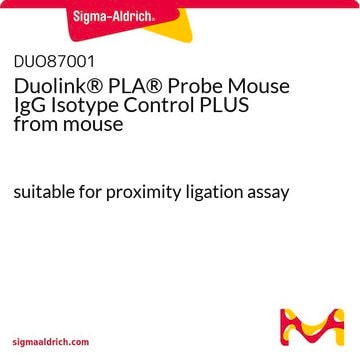おすすめの製品
由来生物
rat
品質水準
抗体製品の状態
purified immunoglobulin
抗体製品タイプ
primary antibodies
クローン
monoclonal
化学種の反応性
mouse, human
包装
antibody small pack of 25 μg
テクニック
immunohistochemistry: suitable (paraffin)
western blot: suitable
アイソタイプ
IgG2a
UniProtアクセッション番号
ターゲットの翻訳後修飾
unmodified
遺伝子情報
mouse ... Pax1(18503)
詳細
Paired box protein Pax-1 (UniProt: P09084) is encoded by the Pax1 (also known as Pax-1) gene (Gene ID: 18503) in murine species. Pax-1 is a transcriptional activator that plays a role in the formation of segmented structures of the embryo and has important role in the normal development of the vertebral column. Mutations in Pax1 gene are associated with vertebral malformations. Undulated homozygous mice exhibits vertebral malformations along the entire rostro-caudal axis. Pax genes are vital for the specification of progenitor cells and for maintenance of progenitor cell fate, including that of cancer cells. Pax1 gene is silenced by methylation in ovarian and cervical cancers and may serve as a tumor suppressor gene. The methylation levels of Pax1 gene is significantly higher in tumor tissues compared to non-tumor paracancerous tissues. Hence, methylation status of Pax1 may serve as useful biomarkers for the detection of cervical cancer and is also a good prognostic indicator for oral squamous cell carcinoma. (Ref.: Huang J et al (2017). Int. J. Environ. Res. Public Health. 14(2). pii: E216).
特異性
Clone 5A2 detects Paired box protein Pax-1 in murine tissues.
免疫原
GST-tagged full-length murine recombinant paired box protein Pax-1.
アプリケーション
Research Category
アポトーシス及び癌
アポトーシス及び癌
Detect Paired box protein Pax-1 using this rat monoclonal Anti-Pax1, clone 5A2, Cat. No. MABE1115-25UG, validated for use in Immunohistochemistry (Paraffin) and Western Blotting.
Western Blotting Analysis: A representative lot detected Pax1 in Western Blotting applications (Feederle, R., et. al. (2016). Monoclon Antib Immunodiagn Immunother. [Epub ahead of print]).
Immunohistochemistry Analysis: A representative lot detected Pax1 in Immunohistochemistry applications (Feederle, R., et. al. (2016). Monoclon Antib Immunodiagn Immunother. [Epub ahead of print]; Kist, R., et. al. (2014). PLoS Genet. 10(10):e1004709).
Immunohistochemistry Analysis: A 1:200 dilution from a representative lot detected Pax1 in Embryonic mouse head (E14.5) (Courtesy of Dr. Heiko Peters, Ph.D., Institute of Genetic Medicine, Newcastle University, United Kingdom).
Western Blotting Analysis: A 1:10 dilution from a representative lot detected Pax1 in d11.5 embryonic vertebral column tissue lysates (Courtesy of Dr. Heiko Peters, Ph.D., Institute of Genetic Medicine, Newcastle University, United Kingdom).
Immunohistochemistry Analysis: A representative lot detected Pax1 in Immunohistochemistry applications (Feederle, R., et. al. (2016). Monoclon Antib Immunodiagn Immunother. [Epub ahead of print]; Kist, R., et. al. (2014). PLoS Genet. 10(10):e1004709).
Immunohistochemistry Analysis: A 1:200 dilution from a representative lot detected Pax1 in Embryonic mouse head (E14.5) (Courtesy of Dr. Heiko Peters, Ph.D., Institute of Genetic Medicine, Newcastle University, United Kingdom).
Western Blotting Analysis: A 1:10 dilution from a representative lot detected Pax1 in d11.5 embryonic vertebral column tissue lysates (Courtesy of Dr. Heiko Peters, Ph.D., Institute of Genetic Medicine, Newcastle University, United Kingdom).
品質
Evaluated by Western Blotting in mouse esophagus tissue lysate.
Western Blotting Analysis: 1 µg/mL of this antibody detected Pax1 in 10 µg of m ouse esophagus tissue lysate.
Western Blotting Analysis: 1 µg/mL of this antibody detected Pax1 in 10 µg of m ouse esophagus tissue lysate.
物理的形状
Protein G purified
Format: Purified
Purified rat monoclonal antibody IgG2a in buffer containing 0.1 M Tris-Glycine (pH 7.4), 150 mM NaCl with 0.05% sodium azide.
保管および安定性
Stable for 1 year at 2-8°C from date of receipt.
その他情報
Concentration: Please refer to lot specific datasheet.
免責事項
Unless otherwise stated in our catalog or other company documentation accompanying the product(s), our products are intended for research use only and are not to be used for any other purpose, which includes but is not limited to, unauthorized commercial uses, in vitro diagnostic uses, ex vivo or in vivo therapeutic uses or any type of consumption or application to humans or animals.
適切な製品が見つかりませんか。
製品選択ツール.をお試しください
保管分類コード
12 - Non Combustible Liquids
WGK
WGK 1
引火点(°F)
Not applicable
引火点(℃)
Not applicable
試験成績書(COA)
製品のロット番号・バッチ番号を入力して、試験成績書(COA) を検索できます。ロット番号・バッチ番号は、製品ラベルに「Lot」または「Batch」に続いて記載されています。
Leyao Shen et al.
eLife, 11 (2022-03-10)
Cellular differentiation is associated with the acquisition of a unique protein signature that is essential to attain the ultimate cellular function and activity of the differentiated cell. This is predicted to result in unique biosynthetic demands that arise during differentiation.
ライフサイエンス、有機合成、材料科学、クロマトグラフィー、分析など、あらゆる分野の研究に経験のあるメンバーがおります。.
製品に関するお問い合わせはこちら(テクニカルサービス)





